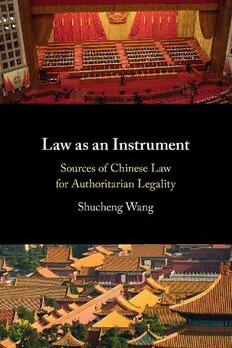Table Of ContentLAW AS AN INSTRUMENT
Howcanthelawbeemployedpragmaticallytofacilitatedevelopmentand
underpinilliberalprinciples?ThecaseofcontemporaryChinashowsthat
the law plays an increasingly important role in the country’s illiberal
approach to both domestic and China-related global affairs, which has
posed intellectual challenges in understanding it with reference to con-
ventional, Western legal concepts and theories. This book provides a
systematic exploration of the sources of Chinese law as pragmatically
reconfigured in context, aiming to fill the gap between written and
practisedlaw.Incombinationwithfieldworkinvestigations,itconceptu-
alises various formal and informal laws, including the Constitution,
congressionalstatutes,supremecourtinterpretations,judicialdocuments,
guidingcases andjudicial precedents. Moreover,it engages atheoretical
analysis of legal instrumentalism, illuminating how and why the law
works as an instrument for authoritarian legality in China, with inter-
nationalreflectionsonothercomparableregimes.
Shucheng Wang is an Associate Professor at the School of Law, City
University of Hong Kong. He was a Fulbright Scholar (Emory
University) and a Clarendon Scholar (Oxford University). He has
authored three books and over fifty articles. He is also an affiliated
researcher of the Law and Religion in the Asia Pacific Region program
atTheUniversityofQueensland,Australia.
LAW AS AN INSTRUMENT
Sources of Chinese Law for Authoritarian Legality
SHUCHENG WANG
CityUniversityofHongKong
UniversityPrintingHouse,CambridgeCB28BS,UnitedKingdom
OneLibertyPlaza,20thFloor,NewYork,NY10006,USA
477WilliamstownRoad,PortMelbourne,VIC3207,Australia
314–321,3rdFloor,Plot3,SplendorForum,JasolaDistrictCentre,NewDelhi–110025,India
103PenangRoad,#05–06/07,VisioncrestCommercial,Singapore238467
CambridgeUniversityPressispartoftheUniversityofCambridge.
ItfurtherstheUniversity’smissionbydisseminatingknowledgeinthepursuitof
education,learning,andresearchatthehighestinternationallevelsofexcellence.
www.cambridge.org
Informationonthistitle:www.cambridge.org/9781009152563
DOI:10.1017/9781009152556
©ShuchengWang2022
Thispublicationisincopyright.Subjecttostatutoryexception
andtotheprovisionsofrelevantcollectivelicensingagreements,
noreproductionofanypartmaytakeplacewithoutthewritten
permissionofCambridgeUniversityPress.
Firstpublished2022
AcataloguerecordforthispublicationisavailablefromtheBritishLibrary.
LibraryofCongressCataloging-in-PublicationData
Names:Wang,Shucheng,1982-author.
Title:Lawasinstrument:sourcesofChineselawforauthoritarianlegality/ShuchengPeterWang,
AssociateProfessor,SchoolofLaw,CityUniversityofHongKong.
Description:Cambridge,UnitedKingdom;NewYork,NY:CambridgeUniversityPress,2022.|
Includesbibliographicalreferencesandindex.
Identifiers:LCCN2021061909(print)|LCCN2021061910(ebook)|ISBN9781009152563
(hardback)|ISBN9781009152570(paperback)|ISBN9781009152556(epub)
Subjects:LCSH:Law–China–Philosophy.|Law–Politicalaspects–China.|Ruleoflaw–China.|
Lawandsocialism.|Authoritarianism–China.
Classification:LCCKNQ464.W3642022(print)|LCCKNQ464(ebook)|DDC340/.1150951–
dc23/eng/20220331
LCrecordavailableathttps://lccn.loc.gov/2021061909
LCebookrecordavailableathttps://lccn.loc.gov/2021061910
ISBN978-1-009-15256-3Hardback
CambridgeUniversityPresshasnoresponsibilityforthepersistenceoraccuracy
ofURLsforexternalorthird-partyinternetwebsitesreferredtointhispublication
anddoesnotguaranteethatanycontentonsuchwebsitesis,orwillremain,
accurateorappropriate.
To my family
哀公问曰:“何为则民服?”孔子对曰:“举直错诸枉,则民服;
举枉错诸直,则民不服。”(《论语》二章十九节)
TheDukeAiasked,saying,“Whatshouldbedoneinordertosecure
thesubmissionofthepeople?”Confuciusreplied,“Advancethe
uprightandsetasidethecrooked,thenthepeoplewillsubmit.
Advancethecrookedandsetasidetheupright,thenthepeoplewill
notsubmit.”
TheAnalects,2:19(Englishtranslation:JamesLegge)
Owenooneanything,excepttoloveeachother,fortheonewholoves
anotherhasfulfilledthelaw.Forthecommandments,“Youshallnot
commitadultery,Youshallnotmurder,Youshallnotsteal,Youshall
notcovet,”andanyothercommandment,aresummedupinthis
word:“Youshallloveyourneighborasyourself.”Lovedoesnowrong
toaneighbor;thereforeloveisthefulfillingofthelaw.
Romans13:8–10(EnglishStandardVersion2016)
CONTENTS
List of Figures viii
List of Tables ix
Preface and Acknowledgements xi
List of Abbreviations xv
1 Introduction: Emergence of Chinese Law? 1
2 A Dual Constitution with Illiberal Characteristics 16
3 Judicial Interpretation as a de facto Primary Statute
for Adjudication 60
4 The Judicial Document as Informal State Law 82
5 Guiding Cases as a Form of Statutory Interpretation 109
6 Bureaucratization of Judicial Precedents 137
7 Concluding Reflections: Chinese Law, Authoritarian Legality
and Legal Instrumentalism 162
Appendix: Methodology and Data 181
Bibliography 188
Index 215
vii
FIGURES
2.1 Prerogativechainofthedualconstitution 58
7.1 Ideologicalinstantiationsoflegalinstrumentalism 169
viii
TABLES
3.1 EvolutionofthestatusofSupremePeople’sCourt’sjudicialinterpretationin
trialpractice 77
4.1 TypesofChinesecourtdocuments 85
4.2 CategoriesofjudiciallawmakingexercisesbyChinesecourts 106
5.1 MainPointsofAdjudicationoftheGuidingCasetointerprettherelated
legalrule(s)[anexample] 122
6.1 Varietyoftypical-case-selectionmovementsoftheSupremePeople’sCourt 155
6.2 HierarchyofcaseguidancesysteminChina 158
7.1 Dynamicsofauthoritarianlegality 175
A.1 Listofinterviewsubjects 184
ix

